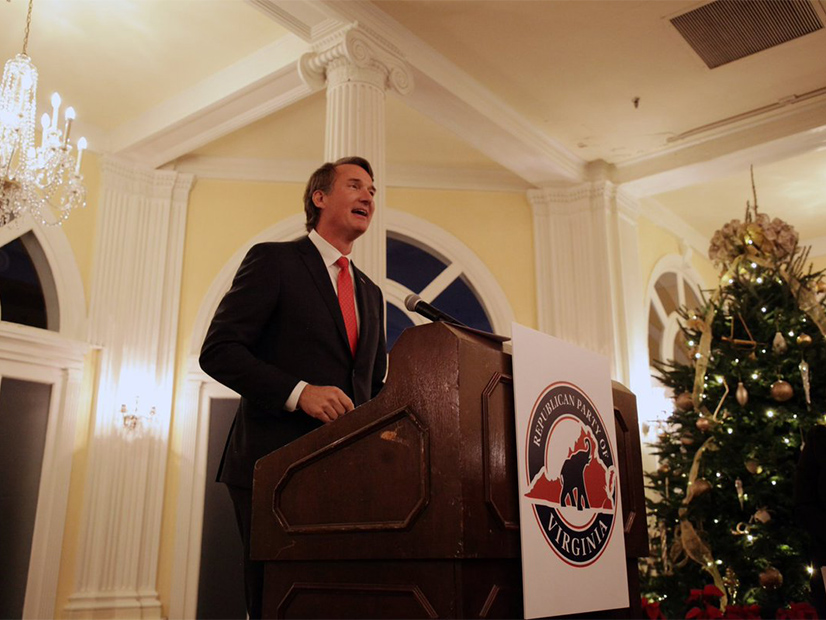Governor-elect Glenn Youngkin (R) said Wednesday he will pull Virginia from the Regional Greenhouse Gas Initiative by executive order once he takes office, but RGGI supporters said he doesn’t have the power to do so.
“RGGI will cost ratepayers over the next four years an estimated $1 billion to $1.2 billion,” Youngkin said in a speech at the annual meeting of the Hampton Roads Chamber of Commerce in Virginia Beach, according to the Richmond Times-Dispatch. “RGGI describes itself as a regional market for carbon, but it is really a carbon tax that is fully passed on to ratepayers. It’s a bad deal for Virginians. It’s a bad deal for Virginia businesses.”
In August, the Virginia State Corporation Commission approved Dominion Energy’s request to recover RGGI costs from ratepayers, which the utility estimated would cost the typical residential customer $2.39/month. Youngkin cited a Dominion filing Monday asking the SCC for permission to increase the surcharge to $4.37/month beginning Sept. 1, 2022.
Authority Questioned
The Democratic-controlled legislature approved a bill to join RGGI in 2020. Youngkin will take office Jan. 15 with a Republican-controlled House of Delegates but with Democrats still in control of the Senate.
As part of the compact, RGGI’s members — including Connecticut, Delaware, Maine, Maryland, Massachusetts, New Hampshire, New Jersey, New York, Rhode Island and Vermont — agree to a declining cap on CO2 emissions from the power sector.
The Department of Environmental Quality’s (DEQ) regulation implementing the law capped CO2 emissions for Virginia at 27.1 million short tons for calendar year 2021 and decreases the emissions cap annually by about 3% to reach a 30% reduction from 2020 levels by 2030. Emission sources subject to the rule must obtain and surrender a CO2 emission allowance for every short ton emitted.
“I can assure you there’s a lot of lawyers … that are busy going to the [law] books right now,” Sen. Lynwood Lewis (D), who sponsored the RGGI authorization in the Senate, told The Washington Post.
“I thought Virginia freed itself from an all-powerful monarch in 1776? Perhaps Glenn Youngkin still thinks he’s a CEO and can’t recall his fourth grade separation-of-powers lesson?” tweeted Sen. Scott Surovell (D).
Youngkin’s transition office issued a statement saying the governor has authority to leave RGGI because “Virginia’s participation is governed by a contract agreement, signed by the Department of Environmental Quality and other regulations.”
 University of Virginia Law School Associate Professor Cale Jaffe | UVA School of Law
University of Virginia Law School Associate Professor Cale Jaffe | UVA School of Law
University of Virginia Law School Associate Professor Cale Jaffe, director of the Environmental Law & Community Engagement Clinic, told the Virginia Mercury that although the governor will have authority over DEQ — which the legislation directed to manage the program — it would require action by the seven-member Air Pollution Control Board to quit RGGI. “The governor cannot just undo regulations that he might not like via executive order,” Jaffe said.
Democrats currently have a 7-0 majority on the board, and it could take Youngkin three years to win control of it. Two members’ terms expire next June; one expires in 2023; and two more expire in 2024.
Lee Francis, a spokesman for the Virginia League of Conservation Voters, which supports RGGI, agreed with Jaffe’s analysis. “Youngkin’s proposal is grounded in neither fact or law,” Francis told the Times-Dispatch.
Impact Challenged
In addition to legal questions over Youngkin’s authority, the governor-elect’s statement sparked a debate over RGGI’s impact.
Del. Todd Gilbert (R), who will become House speaker, said RGGI’s impact on climate change has been “negligible at best.”
“Virginia was reducing carbon emissions from power plants at a rate comparable to RGGI states before joining the cap-and-trade group,” Gilbert said in a statement. “When a policy costs the public a significant amount of money for no tangible benefit, that policy should be examined carefully and, if practical, rolled back.”
Dominion, which opposed joining RGGI, agreed, saying it continues to believe it “would result in a financial burden on its customers with no real mitigation of GHG emissions regionally.”
“Here in Virginia, we are focused on an all-of-the-above approach to sustainability while keeping our rates below the national average and our service reliability strong,” spokesperson Rayhan Daudani said. “This includes the largest offshore wind project in the nation, transformation of the grid, re-licensure of our nuclear units, energy storage and solar energy, all of which creates jobs and economic opportunity.”
But others said Youngkin’s action would eliminate the source of hundreds of millions in funding for flood preparedness and energy efficiency. Youngkin also told the chamber of commerce Wednesday he would develop a plan to “combat sea-level rise.”
The state is directing 50% of its RGGI auction proceeds to low-income energy-efficiency programs and 45% to a new Community Flood Preparedness Fund. The remainder offsets administrative expenses.
“Regardless of your political party, if you’re a legislator in an area that’s impacted by sea-level rise of just recurrent flooding … you should be very reluctant and cautious in completely devastating that fund,” Sen. Lewis said. “This was going to provide a significant source of revenue.”
Rising Prices
Virginia raised $227.6 million this year in carbon credit auctions this year, including $85.6 million in the quarterly results announced last week. The DEQ had previously predicted the state’s annual proceeds would be between $104 million and $109 million.
Last week’s quarterly auction cleared at $13/ton — the highest price and single largest price jump in the program’s history. (See RGGI Price Hits Record High, Jumps 40% over Last Auction.)
Dominion’s Dec. 6 filing with the SCC estimated the company will need 19 million allowances to cover the emissions from its Virginia-based generation fleet for the year beginning in September. The company said it assumed a weighted average price of $10.53/allowance based on December ICE futures contracts for 2021 and 2022 and the ICF International forward price curve for 2023.
Reaction
Environmental groups and others reacted with alarm to leaving RGGI.
The Northern Virginia Affordable Housing Alliance tweeted, “Saving $54 annually per household is not worth the tradeoff” with the loss of the EE funding.
“This is the wrong decision,” said Virginia Advanced Energy Economy.
Lynnhaven River Now, an environmental group, tweeted that Youngkin’s move would “gut” the flood preparedness fund.
“Hell no! This is unacceptable,” tweeted the Chesapeake Climate Action Network.
U.S. Rep. Don Beyer (D-Va.) tweeted that withdrawing from RGGI “would mean Glenn Youngkin’s first steps as governor of Virginia are steps backwards. He has time to take a closer look at this and reconsider, and that is what he should do.”
Maryland Del. Marc Korman (D) noted that Republican Gov. Larry Hogan attempted to pull Maryland from RGGI and was blocked by the legislature. “We are still in the cap-and-trade program,” he tweeted.




